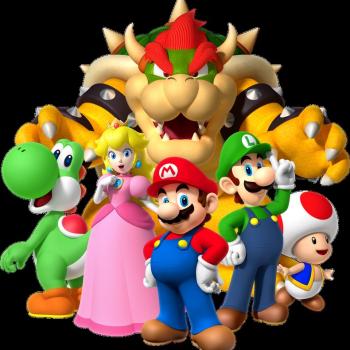Review of Despicable Me 2, directed by Pierre Coffin and Chris Renaud
By Josiah & Carolyn Davis
Adoption is a sort of salvation—saving orphans from orphanhood—so much so that the Bible talks of our “adoption” by God as part of our salvation from sin and death (Ephesians 1:5). However, in Despicable Me 2, there is a twist. Instead of the typical tale of a parent being the “savior,” the tables are turned. Despicable Me 2 presents the heartwarming story of adopted children who “save” their father through their love.
 Gru (voiced by Steve Carell) is an un-savory character. He has a hunched back, spindly legs, a bald head, a long nose and a decidedly checkered history as marred as his appearance. Wherever he goes he can’t help making messes and destroying things with no apparent purpose outside of his own devious and selfish desires. He is a despicable villain after all, with a resume of accomplishments that includes stealing, destroying and wreaking havoc on an epic scale. These qualities unfortunately carry over into his relationship with his girls, whom he adopted at the end of the first Despicable Me (2010). Gru as a dad is gruff, controlling, and despicable.
Gru (voiced by Steve Carell) is an un-savory character. He has a hunched back, spindly legs, a bald head, a long nose and a decidedly checkered history as marred as his appearance. Wherever he goes he can’t help making messes and destroying things with no apparent purpose outside of his own devious and selfish desires. He is a despicable villain after all, with a resume of accomplishments that includes stealing, destroying and wreaking havoc on an epic scale. These qualities unfortunately carry over into his relationship with his girls, whom he adopted at the end of the first Despicable Me (2010). Gru as a dad is gruff, controlling, and despicable.
Gru’s despicable qualities are in stark contrast with his girls, especially the youngest. Agnes is the antithesis of Gru. Gru blows things up or freezes them for his maniacal purposes; Agnes makes everything around her better through her cheerful attitude and unselfish character. In the opening scene, instead of complaining about not having a real fairy princess at her birthday party, something that she was looking forward to, she overlooks the fact for the sake of her friends having a good time.
Even though her father was once a villain, Agnes sees the best in Gru (mirroring her Dickensian namesake). She overlooks his bumbling nature, his ugly appearance, his marred past and she accepts him as her father. She loves him unconditionally. This love is what drives Gru to be a better person.
The love of his daughters and the parenting experience has a sanctifying effect on Gru. His character is transformed through his experience of adopting the girls until he is a new man, the complete opposite of what he once was. He is aware of the needs of his children and is nurturing to them. The scene where he tucks them into bed at night shows that he knows how to treat his daughters with gentleness and kindness. He doesn’t take himself too seriously. In one of the most hilarious scenes in the movie, he dresses up as a fairy for the sake of making his daughter’s birthday party fun.
Not only is he more gentle and humble, but he also learns to make sacrifices for his family. The first movie told the story of Gru’s transformation from super-villain to dad; this tells the story of his growth as father while juggling the call of adventure. He gave up his exciting career as a villain to become a jam and jelly manufacturer, a very boring career in comparison, so that he can spend time with his daughters. When, in this movie, he is asked to return to the cloak and dagger world, this time as a good guy, his daughters are on the forefront of his mind. He is torn between a thrilling new adventure and the well-being of his family. Consequently his daughters are supportive of this new career and he decides to pursue it. This venture turns out to be much more dangerous than he anticipated. Over the course of the movie there is a shift in Gru’s motivation for continuing with the new job – from chasing a big name and excitement to protecting those he loves. His love for his family and priorities are made clear as the movie progresses. He is more than willing to make sacrifices for the sake of the well-being of his family.
By the end of the movie, Gru is a new man. He realizes he cannot control everything but can only do his best. This shows his humanity. He realizes that he cannot stop his oldest daughter from wanting to date and he cannot guarantee the safety of his daughters. The love of Gru is clearly demonstrated for his family as he gives up his original identity as a villain, his career and risks his life for the safety of his family. The end of the movie really brings to light the sanctifying power parenting had in Gru’s life. Having the unconditional love of his family spurred him on to make hard decisions and do what was challenging for the sake of others.
Parenting inevitably brings to light our fallen and selfish nature. Gru’s parenting brought his ugly character qualities to light; however, parenthood did not simply bring them to light, it also transformed him from a self-centered villain into a sacrificially loving father – especially made clear from the first movie to the second. Our difficult circumstances are often the means God uses to refine us for the better. Christ’s love transforms our broken, selfish nature into something new that we are not at all naturally inclined to. For Christians, Christ’s unconditional love continually sanctifies us to the likeness of Him – something unnatural to our sinful self. This charming children’s movie brought these profound truths to light. Parenting and adoption were, in a very real sense, the best things that happened to Gru.












